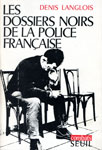The uprisings of May-June 1968 opened new horizons of contestation against the State, its agents and an imposed order that paid no heed to the opinions of citizens.
This dynamic force penetrated publishers’ catalogues, as well as the prosecution they had to endure.
A new and politicized perception of the professional corps was constructed, together with events that constituted a ‘spring of the social sciences’.
The solemn moralising of the bourgeoisie was refuted by claims concerning women’s social role, the visibility of homosexuality and all sexuality, as the refusal of pro-family policy was challenged by the right to abortion…
Interconnected, these combats for the international emancipation of citizens continued to progress as governments did their utmost to suffocate them.
‘Those – and they are many – who sincerely believe that the maintenance or the strengthening of censorship is the last dam against a rising flood of filth, barbarianism, subversion of values and decadence, must be reminded what the real threat to society is, and especially to its youth. It has never been one publication or another, but injustice, social violence, the impunity of all kinds of traffickers, the unbridled reign of money, the divorce between the values taught (not only by teachers) and the values experienced in life, the disdain for the weak, the isolated, the unorganised.’
Robert Errera, ‘Les infortunes de la censure’, Esprit, March, 1973.




